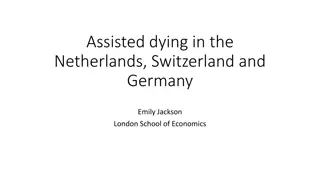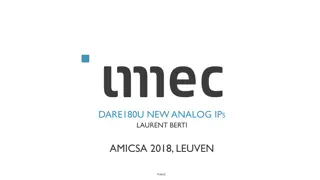
Overview of IPS Program Development in Switzerland
Explore the growth and challenges of Individual Placement and Support (IPS) programs in Switzerland, including insights from the Inaugural European IPS Meeting. Learn about the availability of IPS at psychiatric university hospitals in Bern, Lausanne, and Zurich, funding sources, and barriers to implementation.
Download Presentation

Please find below an Image/Link to download the presentation.
The content on the website is provided AS IS for your information and personal use only. It may not be sold, licensed, or shared on other websites without obtaining consent from the author. If you encounter any issues during the download, it is possible that the publisher has removed the file from their server.
You are allowed to download the files provided on this website for personal or commercial use, subject to the condition that they are used lawfully. All files are the property of their respective owners.
The content on the website is provided AS IS for your information and personal use only. It may not be sold, licensed, or shared on other websites without obtaining consent from the author.
E N D
Presentation Transcript
Inaugural European IPS Meeting Inaugural European IPS Meeting 22 22nd April 2021 by ZOOM ndApril 2021 by ZOOM Switzerland Dirk Richter Bern University Hospital for Mental Health/Bern University of Applied Sciences Wolfram Kawohl Clienia Schloessli Hospital/Psychiatric University Hospital Zurich
Psychiatric university hospitals with IPS programs 8.5 million inhabitants, 25 % non-swiss residents 26 cantons 4 languages
Overview of IPS in Switzerland I IPS is primarily available at the psychiatric university hospitals in Bern, Lausanne and Zurich Zurich: currently 10 SE specialists Bern: currently 10 SE specialists Lausanne: currently 12-15 SE specialists Scale of IPS provision Clients (in normal times) Bern About 80 clients per year Zurich About 100 clients per year Lausanne About 130 clients per year 3
Overview of IPS in Switzerland II The university hospitals where IPS is offered are part of the regular mental health services in their regions. There is no such thing as a level structure of mental health services in Switzerland. IPS/SE is just one part of the employment arrangements that are available besides conventional occupational rehabilitation programs. Health and welfare landscape Most of the early key leaders in the Swiss IPS movement have been academics who are now retired. IPS/SE is funded in general by the Swiss Invalidity Insurance that receives 1.4 % from each salary in the country. The particular funding for individual cases is provide by the cantonal disability pension authorities. Conditions vary between cantons. Funding 4
Development of IPS in Switzerland IPS was introduced via research studies: EQOLISE Zurich 2003 IPS-SE study Bern 2003 Lausanne followed in 2009 with a SE program that switched to IPS in 2012 Barriers and facilitators Research has been the main facilitator for implementation Conventional rehabilitation programs have a huge lobby in the country and compete with IPS programs for funding There is no evidence-based process associated with funding decision- making Main discrepancies to US IPS model Invalidity insurance insists on pre-selection of clients No regular evaluation on the basis of the fidelity scale 5
Evaluation of the Bern IPS program Routine data evaluation 2005 to 2016 In-depth analysis of changes Comparison with a meta-analysis of SE routine programs 6
Meta-analysis of SE routine programs Any competitive employment 7
Percentage of clients in competetive employment Bern program 60 50 50 46 43 40 30 22 20 17 10 0 SE - RCTs PVT - RCTs SE - Routine PVT - Routine IPS/SE Bern program SE Supported Employment pooled data PVT Pre-vocational training pooled data
Percentage of any competitive employment vs. permanent employment ICD groups 60 50.8 48.4 50 46.2 38 40 37.1 35.7 33.3 30 30 23.8 23.4 20 10 0 F2 F3 F4 F6 Total Any competitive employment Permanent employment
Percentage of ICD-diagnosis per year (entries) Bern program 70 60 50 40 30 20 10 0 2005 2006 2007 2008 2009 2010 2011 2012 2013 2014 2015 2016 F2 F3 F4 F6 sonst.
Further IPS studies and activities in Zurich ZhEPP ZInEP RCT IPS for people with mental illness on social benefits longitudinal study several publications concerning job status, stigma RCT dose finding study; several publications concerning length of placement time, quality of life, influencing factors introduction of IPS in non-university hospitals in the Canton of Zurich 11
New cohorts and innovation New cohorts People who already receive disability pensions Job retention Supported Education Start2Work program at Bern Long Covid population Innovation Augmentation: digital skills training on the job 12
Recent publications R ssler W et al.: 'Placement budgets' for supported employment: impact on employment rates in a multicentre randomised controlled trial. Br J Psychiatry 2020, 216(6):308-313. Hoffmann, H./Richter, D.: Supported employment in Switzerland-Are we on track? Psychiatr Rehabil J 2020, 43(1):72-75 R ssler W et al.: Predictors of Employment for People With Mental Illness: Results of a Multicenter Randomized Trial on the Effectiveness of Placement Budgets for Supported Employment. Front Psychiatry 2019, 10:518. Richter D./Hoffmann H.: Effectiveness of supported employment in non-trial routine implementation: systematic review and meta-analysis. Soc Psychiatry Psychiatr Epidemiol 2019, 54(5):525-531. Richter D. et al: Supported Employment in Routine Operation: Evaluation of the Bern Job Coach Placement Program 2005 2016 (in German). Psychiatr Prax 2019, 46(6):338-341. 13






















